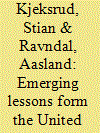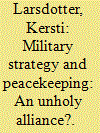| Srl | Item |
| 1 |
ID:
106198


|
|
|
|
|
| Publication |
2011.
|
| Summary/Abstract |
Since December 2008, protection of civilians has been the primary task of the United Nations (UN) mission in the Democratic Republic of Congo (DRC). Guidance on how UN military units can contribute to the protection of civilians has been lacking, however. This has necessitated a bottom-up approach to protection of civilians in which the mission and its partners have developed a series of cross-cutting protection initiatives. The UN military plays a key role in many of them. Based on the findings of a 2010 field study conducted in the DRC, the paper discusses how UN military units can contribute to protection of civilians in three dimensions, namely civil-military cooperation, the use of intelligence, and the use of military force. The aim is to inform the preparation of military contributions to future missions mandated to protect civilians.
|
|
|
|
|
|
|
|
|
|
|
|
|
|
|
|
| 2 |
ID:
134389


|
|
|
|
|
| Summary/Abstract |
In late 2012, a rebel force captured Goma, a provincial capital in the eastern Congo. This event spurred a renewed debate on the use of force by UN peacekeepers. These had begun in the Congo in 1960 with a UN operation led by Ralph Bunche – the UN official who largely defined UN peacekeeping. This article summarizes UN intervention in the Congo and the use of force since then. It traces the main contours of UN engagement and then draws some conclusions about when and where the use of force can be successfully employed – or best avoided – by UN peacekeepers.
|
|
|
|
|
|
|
|
|
|
|
|
|
|
|
|
| 3 |
ID:
165098


|
|
|
|
|
| Summary/Abstract |
Despite the increased use of military force in peacekeeping operations in the twenty-first century, these operations are not included in traditional strategic theory. In this article, I outline the logic of four strategies for peacekeeping operations – defence, deterrence, compellence and offence – and trace the use of these strategies in two consecutive UN operations in the Democratic Republic of the Congo: MONUC and MONUSCO. The article concludes that all four strategies are indeed used in the two operations, but they are neither comprehensive nor proactive, leaving the true potential of military strategy unrealised.
|
|
|
|
|
|
|
|
|
|
|
|
|
|
|
|
| 4 |
ID:
106200


|
|
|
|
|
| Publication |
2011.
|
| Summary/Abstract |
When MONUC (the Mission de l'Organisation des Nations Unies en République Démocratique du Congo) was first deployed in the Democratic Republic of Congo (DRC) in late 1999, the territorial integrity of the DRC was at stake as the country was divided into autonomous f?efdoms controlled by the national government and several rebel groups. Concomitantly, the country also played host to a number of foreign national armies as well as non-state armed groups that took advantage of the confused situation in the DRC to pursue their respective security, economic, or simply survival agendas. In over a decade of deployment, MONUC contributed greatly to the preservation of the DRC's territorial integrity. The mission also played a crucial role in establishing relative peace, security and stability in central Africa's largest state. However, all these achievements could not wipe away significant shortcomings experienced by MONUC, stemming from both internal and external factors to the mission, especially with regard to the protection of civilians.
|
|
|
|
|
|
|
|
|
|
|
|
|
|
|
|
| 5 |
ID:
087829


|
|
|
|
|
| Publication |
2009.
|
| Summary/Abstract |
The UN peacekeeping mission in the Democratic Republic of Congo (MONUC) has been derided as one of the world's least effective peacekeeping forces. This article assesses its performance by using two indicators: mandate implementation and the reduction of human suffering. The analysis shows that effective peacekeeping in the Democratic Republic of Congo (DRC) has been hampered by two major problems. First, MONUC has had a struggle with, and inconsistent approach to, the vague concept of 'robust peacekeeping'. During key moments of the peace process, it tried to wage peace when it should have used force. Second it failed to adapt to a dynamic conflict environment. Both problems were underpinned by flawed assumptions about the peace process, the behaviour of local actors and the presumed benefits of 'post-conflict' elections.
|
|
|
|
|
|
|
|
|
|
|
|
|
|
|
|
| 6 |
ID:
097650


|
|
|
|
|
| Publication |
2009.
|
| Summary/Abstract |
This article discusses political, institutional and operational constraints on the use of force by UN peacekeeping operations. It surveys the experience of the UN Organization Mission in the Democratic Republic of Congo (MONUC) over the period 2005-2007.
|
|
|
|
|
|
|
|
|
|
|
|
|
|
|
|